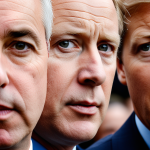Overview of Recent UK Policies and Public Reaction
Recent UK policies have focused heavily on economic recovery, climate change initiatives, and healthcare reforms. The UK government decisions include increased investment in green energy projects, reforms in the National Health Service (NHS) aimed at reducing waiting times, and adjustments to tax regulations aimed at boosting small businesses. These changes directly affect daily life, from energy bills to accessibility of public services.
Public opinion trends initially showed mixed reactions. Many welcomed the environmental policies, viewing them as essential for sustainable progress. In contrast, healthcare reforms sparked debate, with some praising the intention but others expressing concern over implementation. The media reaction reflected this divide, highlighting both optimism for long-term benefits and skepticism regarding short-term disruptions.
Also read : What are the essential elements of a minimalist UK home?
The relevance of these policies is felt broadly across the UK. For example, green energy investments promise cleaner air and job opportunities, affecting communities nationwide. Simultaneously, tax modifications aim to buoy small enterprises, an essential sector in many local economies. Understanding these recent UK policies is crucial for grasping current public sentiment and predicting future political and social developments in the country.
Survey Data and Public Approval Ratings
Recent public opinion polls UK reveal a complex picture regarding attitudes toward recent UK policies. Survey results show fluctuating approval ratings for the UK government decisions, with notable divides across demographics. For instance, younger age groups tend to express more support for climate initiatives, while older voters often focus on healthcare reform outcomes.
Also to discover : What role does the UK play in global environmental efforts?
Approval ratings, measured through various national surveys, peaked following announcements of increased green energy funding but dipped during debates over NHS reforms. Regional variations are significant—urban areas generally display higher approval of environmental policies, contrasting with rural regions where economic concerns predominate.
Political affiliation also plays a crucial role. Conservative supporters often highlight tax reforms positively, whereas opposition parties criticize their adequacy and implementation. Understanding these nuances helps decode the public’s mixed sentiments toward the government’s agenda.
These survey results directly reflect the public’s reception of recent UK policies, underlining the importance of ongoing, detailed polling to capture shifting attitudes. Continuous monitoring of public opinion polls UK aids policymakers in adjusting strategies to enhance effectiveness and public acceptance as surveys expose real-time feedback on government decisions.
Expert Analysis and Case Studies
Expert analysis consistently highlights the multifaceted societal impact of recent UK policies. Political analysts emphasize that while UK government decisions aim to balance economic recovery with environmental goals, the real-world effects vary significantly across communities. Think tank reports illustrate this complexity, noting that green energy investments create jobs but simultaneously disrupt traditional industries, leading to mixed local reactions.
One notable case study involves the NHS reforms. Experts argue these changes address systemic issues like waiting times but caution about the strain on frontline services during transition periods. This assessment aligns with public opinion trends, where initial optimism about reform intentions coexists with concerns about practical implementation.
Analysts often stress the importance of monitoring these policies over time to understand their evolving impact. By integrating quantitative data from survey results with qualitative insights, expert reports provide a nuanced view of how government actions translate into everyday outcomes. This approach aids policymakers in refining strategies to maximize benefits and minimize negative repercussions, reflecting a pragmatic balance between ambition and operational challenges.
Positive and Negative Public Responses
Public reaction to recent UK policies reveals a clear divide between support for UK policies and public criticism, reflecting broader UK societal debates. Many citizens praise the government’s commitment to tackling climate change, viewing environmental initiatives as essential and overdue. Supporters often highlight the promise of green jobs and a sustainable future as key benefits. In contrast, opposition centers on concerns that some policies may overlook immediate socioeconomic hardships, particularly regarding NHS reforms and tax changes affecting small businesses.
Public criticism has manifested in protests and vocal social media campaigns, especially from groups worried about healthcare access and the pace of change in public services. These movements emphasize that while intentions may be positive, UK government decisions require more transparent implementation and better communication to reduce public anxiety.
Media representation tends to amplify this polarization, framing debates as a clash between progressives eager for reform and skeptics fearing disruption. Coverage often underscores the complexity of balancing ambitious goals with everyday realities, which fuels ongoing societal debates. Thus, understanding these public opinion trends is crucial for policymakers aiming to foster constructive dialogue and enhance public trust in policy measures.
Overview of Recent UK Policies and Public Reaction
Recent UK policies reflect bold shifts addressing climate change, healthcare, and economic recovery. The UK government decisions include ramped-up investments in green energy, NHS reforms designed to reduce waiting times, and tax changes targeting small business growth. These initiatives respond to pressing challenges by balancing innovation with public service improvements.
Public opinion trends following these announcements highlight a nuanced reception. Early media coverage showed optimism about environmental progress, yet skepticism grew around the feasibility of timely NHS reforms. In particular, the interplay between enthusiasm for sustainable development and worries about immediate healthcare access shapes ongoing debates.
These recent UK policies influence daily life profoundly, from fluctuations in energy costs to adjustments in healthcare accessibility. For example, renewable energy projects not only aim to reduce carbon footprints but also promise job creation within local communities. Simultaneously, tax reforms intended to support small enterprises impact household economies directly, fueling public scrutiny and interest.
Understanding public opinion trends reveals that policy effectiveness depends not only on content but also on communication and perceived implementation fairness. The government’s capacity to address concerns while maintaining reform momentum will be crucial as these policies evolve and affect citizens across the UK.


